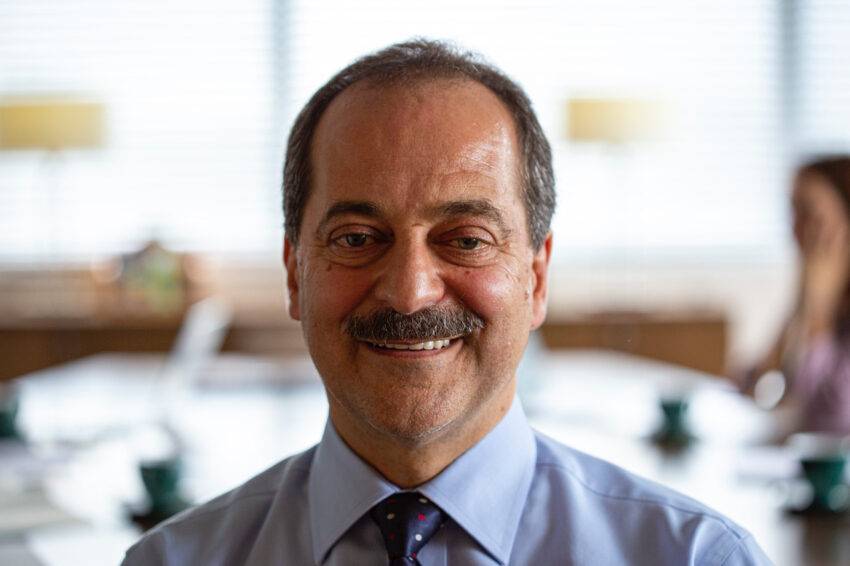There’s more to providing the nation’s finest brew than you think …
A reminder that we should never take high quality tea for granted. This Southampton based company has been inspiring the love and appreciation of high quality tea since 1986. Determined never to compromise on quality, no matter what economic situation the country is facing, has been no mean feat to uphold. Dr Ebraham took some time out of his day to speak to Business Matters
What is the main problem you solve for your customers?
Our main day-to-day business is with our global network of distributors who sell our tea to shops, cafes, restaurants and workplaces in their countries. For these long-standing partners we solve various problems, such as, helping them when they are faced with economic turmoil in their country, or a lack of inventory or facing unforeseen circumstances. We like to think of our relationship with our distributors as a partnership and we work hard to help them grow their businesses as we are growing ours. It’s not a traditional buyer/seller relationship.
What made you start your business – did you want to rock the status quo, was it a challenge or a gap in the marketplace that you could fill?
In 1986 we spotted a gap in the market for the availability of high-quality teas. Once we entered the market, like lots of businesses, we realised that it was much more complicated than we first thought. After four years of hard work we finally turned a corner into profitability and our business has been growing every year since.
What are your brand values?
Wisdom, creativity (with our blends and our packaging) and humanity. Ahmad Tea was founded on a vision that business is an opportunity to give back and we have built a network of local charity partners all over the world who are able to take action where it is needed most. Sharing the fruits of our success with those in need is a big driver for us as a business.
Do your values define your decision-making process?
Yes, they have to. Our values are our blueprint for our business. Our charity work, wisdom and creativity are integrated into the very way we do business.
Is team culture integral to your business?
Yes, absolutely. Creating a team culture means that people work by the same values and also start to make similar decisions on company strategy. It’s more efficient for a business if many peoples’ decisions align.
So what do you do to go the extra mile to show your team you appreciate them?
I always make a conscious effort to thank people for their work. However, as a leader, I’m always thinking about other genuine and sincere ways I can show my appreciation to staff.
What’s your take on inflation and interest rates – are you going to pass that on to your customers or let your margins take a hit and reward customer loyalty in these tougher times?
We always try to minimise any price increases to the end consumer, even when we’re faced with higher costs. Two years ago, when transport costs started rising we decided to take a hit on the margin, hoping that the price rises would slow down. Last year when wages, raw materials and transport costs started rising by double digits, we had to pass on some of the costs. Double digit inflation isn’t great for anyone and we always try to act fairly.
What is your attitude to your fellow tea industry competitors?
Many years ago, I used to be quite conscious of our competitors. However, as I and the business have matured, I’ve come to the conclusion that it’s better to spend my time on what we do, and how to do it better, rather than the other way round.
Do you have any advice for anyone starting out in business?
Don’t put all your money into it. Be patient, pour your heart and time into it. Understand that it’s more than a 9-5 job. Surround yourself with good advisors and listen to their advice.
It can be a lonely and pressured place to be as the lead decision maker of the business. What do you do to relax, recharge and hone your focus?
My religion is very important to me and I pray regularly. This helps me not feel lonely and helps me to remain calm. I also meditate which helps.
Do you believe in the 12 week work method or do you make much longer planning strategies?
As we’re a tea business, we need to take into account the seasonality of tea and therefore we plan in 6–8-week cycles to take into account the latest harvest information. For HR and machinery decisions, we plan in 9–12-month cycles.
What is your company’s eco strategy?
Sustainability is now at the core of our business. We have recently received a gold accreditation from EcoVadis, the world’s largest and most trusted provider of business sustainability ratings. We’re continually investing in every area of production to improve our sustainability credentials and are looking to make small improvements that can make a monumental difference over time.
What three things do you hope to have in place within the next 12 months?
Firstly, I would like to feel on top of my work, I hope 2024 brings us a sense of calmness. Secondly, I would like our management team to have finished their management training programme. I’ve witnessed the positive impact that personal development and management training can have on businesses and at Ahmad Tea we’re committed to help our employees maximise their potential. Thirdly, I would like to have improved our IT capability for the business, to help us keep innovating, increase our performance and efficiency, and finally to improve the speed of business processes and operations.


